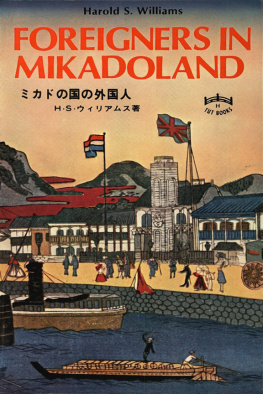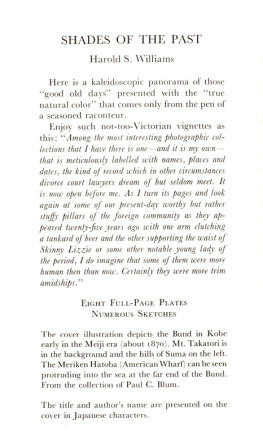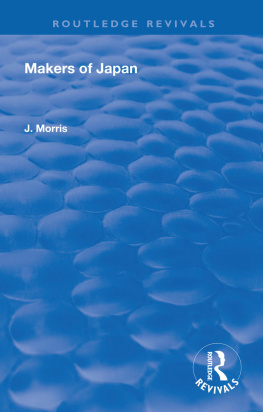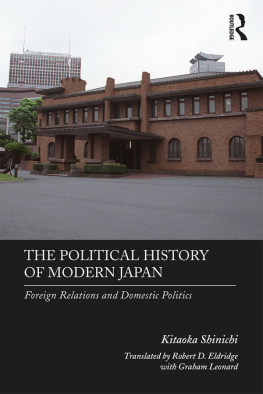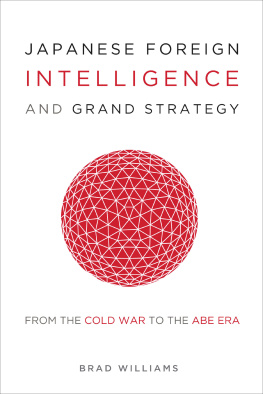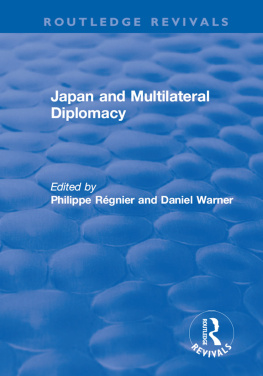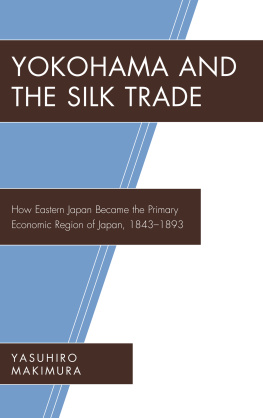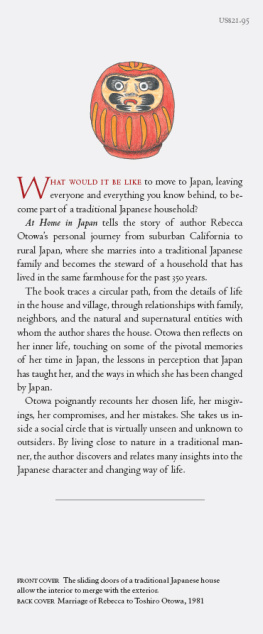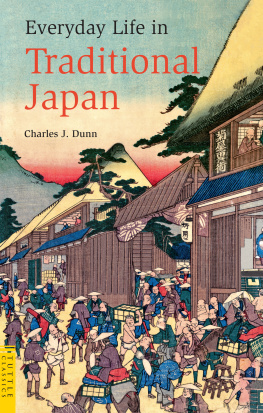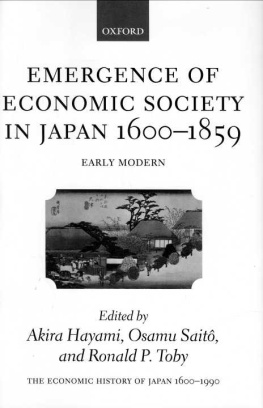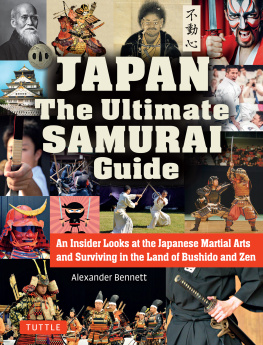ABOUT THE AUTHOR
H. S. Williams was born in Melbourne, Australia, in 1898. He was headed for a scientific career, at first as a junior analyst in the Commonwealth Laboratory of Australia, then as a medical student at the Melbourne University. He was already seriously interested in the Japanese language and history as a hobby, and at the end of his third year in medicine he came to Japan on a holiday.
On arrival in Japan in 1919, an advertisement in the former Japan Advertiser caught his attention, and by replying to it he hoped to have the opportunity of seeing inside one of the hongs in Japan of which he had read so much. He later went for an interview, confident in the belief that he would not be engaged. To his great dismay he found that he was hired as an assistant in the old Scottish hong of Findlay Richardson & Co., Ltd. He thereupon temporarily postponed his return to Australia, but eventually decided to give up his career and make his future in Japan.
Later Williams became managing director of the silk firm of Cooper Findlay & Co., Ltd.
In 1941 he left Japan and enlisted in the Australian Army. He attained the rank of major and saw service in Africa, the Pacific, and Burma. He arrived back in Japan a few weeks after the surrender as a member of the Occupation Forces, and remained in the Australian Army in Japan until 1949 when he resumed his business career.
H. S. Williams is now managing director of A. Cameron & Co., Ltd. and was sole Trustee of the famous James Estate at Shioya near Kobe, which however he recently sold to Japanese interests.
In 1953, he commenced writing historical articles for various publications in Japan and abroad. He is recognized as an authority on the Foreign Settlements in Japan and is the author of two other books dealing with those days: Tales of the Foreign Settlements in Japan and Shades of the Past or Indiscreet Tales of Japan.
APPENDIX (See pages 71, 95)
The sermon, Mr. Bowdler, was bad enough, but the appendix was abominable.
RULES AND REGULATIONS FOR THE PEACE,
ORDER AND GOOD GOVERNMENT OF
BRITISH SUBJECTS WITHIN
THE DOMINIONS OF THE TYCOON OF JAPAN
Whereas by an Order in Council providing for the exercise of Consular Jurisdiction over British Subjects in Japan under 6 and 7 Victoria, Chapter 24, dated the 23rd of January, 1860, power is given to the Consul General and Consuls or Persons duly authorized in such capacities in the dominions of the Tycoon of Japan in the port, place or district in which they may severally reside, to make rules and regulations for the peace, order and good government of Her Majesty's subjects being within the dominions of the aforesaid Tycoon, and for the observance of the Stipulations of any Treaty or Regulations appended thereto, made between Her Majesty, Her heirs, successors and the Tycoon of Japan.
Be it known that I, Rutherford Alcock, Her Majesty's Envoy Extraordinary, Minister Plenipotentiary and Consul General in Japan, in consideration of divers reasons affecting the peace, security and good government of Her Majesty's subjects in Japan, and also in consideration of divers other good and weighty reasons, do hereby make the following Rules and Regulations, to wit:
1. That British subjects shall not ride or drive on any public road or highway in Japan in such a furious or careless manner as to endanger the persons being in any such public road or highway, nor ride or drive in any street of any town or village at a pace beyond that of a walk.
2. That all British subjects in passing along roads and streets in Japan shall, whether walking, riding or driving, observe the following rules of the road ; that is to say, in meeting any person, cortege, procession or vehicle, they shall take and keep the left hand side of the road, and on overtaking and wishing to pass on before any such person, cortege, procession or vehicle, they shall leave the left hand side, and if practicable without collision, but not otherwise, they shall pass on the right side of the road.
3. That the discharge of firearms, whether by night or day in any place in Japan, except in such places and within such limits as shall be designated for the purpose by the Japanese Authorities in concurrence with Her Majesty's Consul, is hereby prohibited.
4. That no British subject shall go out in pursuit of game within the limits of the port of Kanagawa absolutely, or at any Port or other place, save under the authority and sanction of the Consul in writing.
5. That no British subject shall intrude into any private grounds without the invitation or leave of the owners, or into any battery, arsenal or other establishment of any Japanese not ordinarily open to the public.
6. That no British subject shall on any pretence assault or offer any violence to any Japanese official or functionary.
7. That no British subject shall persist in any act of violence or outrage after he shall have been warned to desist therefrom, or in case any such British subject shall refuse or neglect immediately on being charged with the commission of any offence, to deliver a card bearing the stamp and seal of Her Majesty's Consul showing his identity, he shall be liable to arrest by any Japanese official duly empowered according to the Japanese law and by a Consul's warrant or licence.
8. That no British subjects shall in excursions within the limits assigned to each port, take up their residence in the towns or villages ; nor without express permission granted in writing by the Consul, sleep during a night at any place or places away from the Foreign location at the Port where they are domiciled.
9. That every British subject who shall act contrary to any or either of the Rules and Regulations aforesaid shall be liable for each and every offence to pay a fine of $200, or to be imprisoned for one month.
10. That no British subject shall permit any Chinese in his employ to ride anywhere in Japan, except in immediate personal attendance on his master in travelling for a lengthened journey, and then not within a town or village ; and that in case any such Chinese shall so ride with the permission of his master, the master shall be liable to pay a fine for every such offence of $200, or to be imprisoned.
Given under my hand and seal of office at Yeddo within the dominions of the Tycoon of Japan on the 19th day of November, 1861.
Other TUT BOOKS available:
BACHELOR'S HAWAII by Boye de Mente
BACHELOR'S JAPAN by Boye de Mente
BACHELOR'S MEXICO by Boye de Mente
A BOOK OF NEW ENGLAND LEGENDS AND FOLK LORE by Samuel Adams Drake
THE BUDDHA TREE by Fumio Niwa; translated by Kenneth Strong
CALABASHES AND KINGS: An Introduction to Hawaii by Stanley D. Porteus
CHINA COLLECTING IN AMERICA by Alice Morse Earle
CHINESE COOKING MADE EASY by Rosy Tseng
CHOI OI!: The Lighter Side of Vietnam by Tony Zidek
CONFUCIUS SAY by Leo Shaw
THE COUNTERFEITER and Other Stories by Yasu-shi Inoue ; translated by Leon Picon
CURIOUS PUNISHMENTS OF BYGONE DAYS by Alice Morse Earle
CUSTOMS AND FASHIONS IN OLD NEW ENGLAND by Alice Morse Earle
DINING IN SPAIN by Gerrie Beene and Lourdes Miranda King
EXOTICS AND RETROSPECTIVES by Lafcadio Hearn
FIRST YOU TAKE A LEEK: A Guide to Elegant Eating Spiced with Culinary Capers by Maxine J. Saltonstall
FIVE WOMEN WHO LOVED LOVE by Saikaku Ihara ; translated by William Theodore de Bary
A FLOWER DOES NOT TALK: Zen Essays by Abbot Zenkei Shibayama of the Nanzenji
FOLK LEGENDS OF JAPAN by Richard M. Dorson
GLEANINGS IN BUDDHA-FIELDS: Studies of Hand and Soul in the Far East by Lafcadio Hearn

